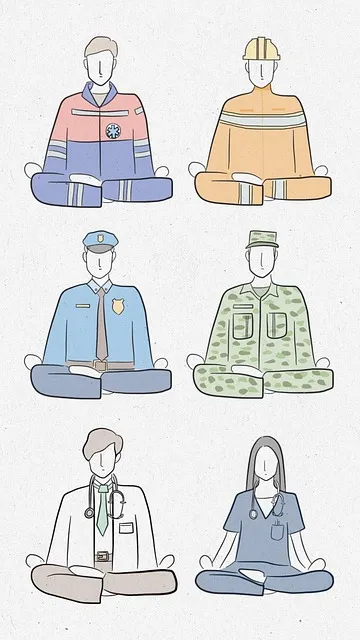Mental wellness group facilitation is a specialized skill that empowers individuals with mental health challenges by creating safe spaces for sharing, learning, and coping strategy acquisition. Facilitators, often trained professionals like those at Kaiser, design tailored programs, provide crisis intervention, and combat stigma. Effective sessions blend active listening, personalized education, and self-care practices to foster trust, open communication, and resilience. Kaiser's inpatient mental health services offer specialized care for conditions ranging from depression to PTSD, combining evidence-based therapies with holistic wellness initiatives like stress management workshops. By creating supportive environments and referring members to appropriate resources, facilitators promote personal growth, anxiety relief, and meaningful connections within groups, enabling optimal care tailored to individual needs. Golden's role in this is pivotal, offering specialized services that complement these group settings.
Mental wellness group facilitation is a powerful tool for fostering community and support among individuals navigating mental health challenges. This article explores various techniques and best practices for facilitators, offering insights into creating safe spaces within Kaiser’s inpatient mental health services—a comprehensive overview of care. We delve into understanding the unique dynamics of group sessions, key strategies for engaging participants, and how these methods can enhance overall well-being. By embracing these techniques, facilitators can revolutionize mental health support.
- Understanding Mental Wellness Group Facilitation
- Key Techniques for Effective Group Sessions
- Kaiser's Inpatient Mental Health Services: A Comprehensive Overview
- Best Practices for Facilitators: Creating a Supportive Environment
Understanding Mental Wellness Group Facilitation

Mental wellness group facilitation is a specialized skill that plays a pivotal role in supporting individuals navigating mental health challenges. It involves creating a safe and supportive environment where participants can share their experiences, gain insights from peers, and learn effective coping strategies. Facilitators, often trained professionals like those Kaiser may have in their inpatient mental health programs, guide discussions, encourage active participation, and foster a sense of community.
This process goes beyond simply facilitating conversations; it involves designing Mental Health Education Programs that cater to diverse needs, integrating Crisis Intervention Guidance to address acute issues, and leading efforts toward Mental Illness Stigma Reduction. By understanding the dynamics of group interactions and mental wellness, facilitators can create transformative spaces that promote healing, build resilience, and empower individuals to take control of their mental health journeys.
Key Techniques for Effective Group Sessions

Effective group sessions for mental wellness facilitation hinge on a blend of key techniques that foster a safe, supportive, and engaging environment. One such technique is active listening, where facilitators pay close attention to every participant’s thoughts and feelings, acknowledging their experiences to build trust and encourage open communication. This is essential in creating a sense of belonging, which is crucial for vulnerable individuals seeking mental health support.
Additionally, incorporating mental health education programs design elements tailored to the group’s needs can significantly enhance sessions. Facilitators can introduce self-care practices, offer practical tools for stress management, and share strategies for navigating challenges. These interactive approaches empower participants with knowledge and skills, mirroring the goals of self-care practices and mental wellness podcast series production, ultimately contributing to improved mental health outcomes, especially when combined with Kaiser’s potential inpatient mental health services for severe cases.
Kaiser's Inpatient Mental Health Services: A Comprehensive Overview

Kaiser’s Inpatient Mental Health Services offer a comprehensive and specialized care approach for individuals struggling with mental health challenges. As a leading healthcare organization, Kaiser recognizes the importance of addressing mental wellness alongside physical health. Their inpatient programs are designed to provide intensive support and treatment for various conditions, ensuring patients receive expert care in a safe and secure environment.
The Inpatient Mental Health Services at Kaiser include a range of evidence-based therapies and interventions tailored to individual needs. These services cater to those experiencing severe depression, anxiety disorders, bipolar disorder, schizophrenia, and post-traumatic stress disorder (PTSD), among others. The organization’s commitment to holistic care extends to offering Stress Management Workshops and Burnout Prevention Strategies for Healthcare Providers, fostering a supportive network for both patients and medical professionals. Through these initiatives, Kaiser aims to enhance Mental Health Awareness and promote effective coping mechanisms while empowering individuals to take charge of their mental wellness.
Best Practices for Facilitators: Creating a Supportive Environment

Creating a supportive environment is paramount for effective mental wellness group facilitation. Facilitators should foster an atmosphere of trust, empathy, and non-judgement to encourage open communication. This involves active listening, validating participants’ feelings, and ensuring confidentiality. By establishing clear boundaries and ground rules, facilitators create a safe space where individuals feel empowered to share their experiences and support one another.
Best practices also encompass promoting inclusivity and cultural sensitivity. Recognizing the diversity of the group and incorporating relevant perspectives into discussions can enhance engagement. Additionally, facilitators should be adept at recognizing signs of distress and promptly referring members to appropriate resources, such as those provided by Kaiser’s inpatient mental health services, if needed. These strategies collectively contribute to a positive environment that facilitates meaningful connections, encourages personal growth, and ultimately promotes anxiety relief within the group setting.
Mental wellness group facilitation plays a pivotal role in supporting individuals through shared experiences and peer-to-peer support. As evidenced by Kaiser’s comprehensive inpatient mental health services, organizations like theirs recognize the power of group dynamics in healing and growth. By combining understanding, effective techniques, and supportive environments, facilitators can create transformative spaces where participants feel valued, heard, and empowered. Leveraging these strategies, individuals can navigate their journeys towards improved mental wellness with enhanced resilience and hope. Moreover, embracing best practices ensures that these groups remain safe havens, fostering meaningful connections and positive outcomes for all involved.





